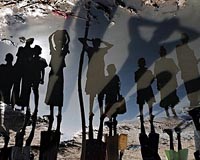| . |  |
. |
Juba, Sudan (UPI) Jan 5, 2011 A last-minute softening of the Khartoum government's rhetoric on the prospect of the Christian-led southern Sudan splitting from the Arab Muslim-ruled north has raised hopes that next week's independence referendum will pass peacefully. But both sides have been arming with tanks and other heavy weapons in case trouble erupts because the Texas-sized south, which fought a 21-year civil war with the regime until 2005, is widely expected to vote for secession. Polling starts Sunday and will go on until Jan. 15. Just more than 3.93 million people have registered to vote in the referendum. That's the culmination of the Comprehensive Peace Agreement that ended the civil war that began in 1983 and cost some 2 million lives. Sudanese President Omar al-Bashir, a former army commander who led the war against the south, visited Juba, the southern capital, Tuesday and, in an uncharacteristically moderate speech, promised voters he would "congratulate and celebrate with you" should they choose secession. That was a remarkable shift in tone from Khartoum's recent hostility and threats to delay the referendum and even refuse recognition of the results if they went against Khartoum. Bashir's conciliatory speech indicated that Khartoum "now appears resigned to the inevitability of a new state arising in the south," the U.S. global security consultancy Stratfor observed. But Stratfor cautioned: "This does not mean that tensions between the north and south will dissipate suddenly. The breakup of the country will not be smooth, and there will likely be moments where it appears that war could erupt. "But Khartoum is not preparing for a fight as its first recourse; rather its focus will be on achieving two main objectives in the months ahead: ensuring it obtains a favorable new oil revenue-sharing agreement with the south and staving off a looming political crisis in what will remain of Sudan." Oil is the vital element in the equation. About 80 percent of Sudan's oil reserves are in the south. Under the 2005 peace deal, Khartoum, which depends on southern oil, has been getting roughly half of all oil revenues from southern crude exports. But that will have to change. The south is depending on oil to be the economic backbone of the new state it seeks. But being landlocked, it needs Sudan's pipelines and terminals to get its crude to market. There has been talk of the south building a pipeline to Kenya's Indian Ocean coast but there are no concrete plans drawn up so that outlet may be years away. The south has the option of cutting off the oil flow to the north if Khartoum doesn't agree to significantly increase Juba's share of the revenue. But that would hurt the south more than Khartoum. Bashir's regime has repeatedly threatened war if other key issues such as border demarcation, foreign debt obligations and the status of the oil-rich Abyei region, which straddles the current north-south boundary, weren't settled before the referendum. These remain unresolved and unless they're swiftly attended to once voting ends, they could mushroom into major obstacles to peaceful coexistence. Bashir is grappling with a political opposition in the north that sees political opportunities to attack him through a southern vote for independence. The opposition is demanding the ruling National Congress Party, which dominates Parliament, concede its power to form a new transitional government that would draw up a new constitution before calling new elections. Bashir, already under pressure because of his indictment by the International Criminal Court for war crimes in Sudan's western Darfur region, refuses to make concessions. He is blamed by many northerners for the imminent breakup of Sudan, Africa's largest country and is likely to deal harshly with any threat to his regime. Meantime, diplomatic sources report that Khartoum and the Sudan People's Liberation Movement in the south have been stockpiling arms. The south's 125,000-strong military now has around 80 tanks plus truck-mounted 122mm multiple rocket launchers and anti-aircraft systems, mainly former Soviet bloc equipment brought in through Kenya. They remain outnumbered by Bashir's 225,000-strong military which has been purchasing armor and building up its air force, particularly ground attack jets, weapons that plagued southern rebels during the civil war.
Share This Article With Planet Earth
Related Links Africa News - Resources, Health, Food
 China to send observers to Sudan for referendum
China to send observers to Sudan for referendumBeijing (AFP) Jan 4, 2011 China said Tuesday it would send observers to its close ally Sudan, where voting on an independence referendum for the south of the country is due to begin at the weekend. "At the invitation of both sides, China will send an observation mission for the referendum," foreign ministry spokesman Hong Lei told reporters. China - which does not elect its leaders by popular vote - is a key su ... read more |
|
| The content herein, unless otherwise known to be public domain, are Copyright 1995-2010 - SpaceDaily. AFP and UPI Wire Stories are copyright Agence France-Presse and United Press International. ESA Portal Reports are copyright European Space Agency. All NASA sourced material is public domain. Additional copyrights may apply in whole or part to other bona fide parties. Advertising does not imply endorsement,agreement or approval of any opinions, statements or information provided by SpaceDaily on any Web page published or hosted by SpaceDaily. Privacy Statement |